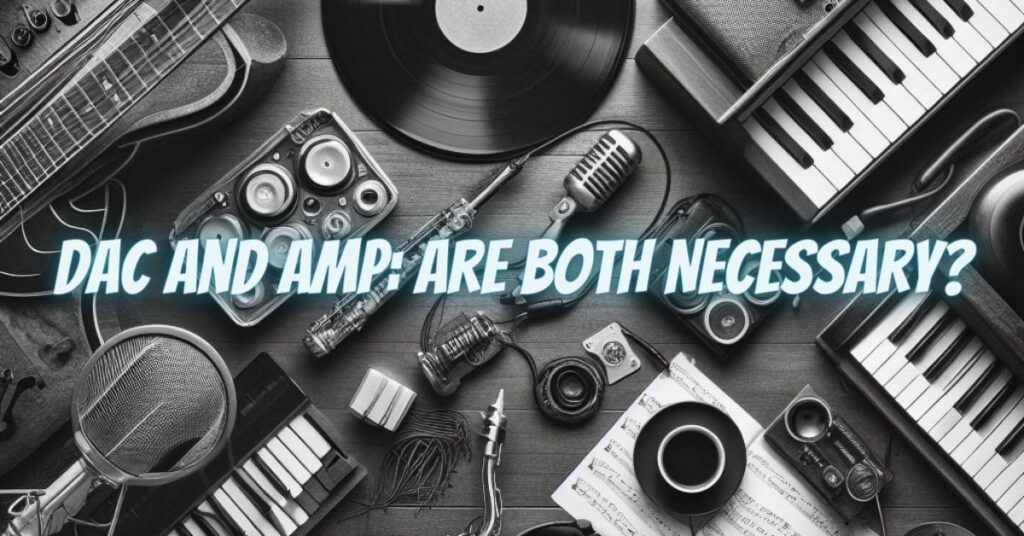The audio landscape has evolved significantly, offering a vast array of choices for audio enthusiasts seeking to enhance their listening experience. Two components that frequently arise in discussions are the Digital-to-Analog Converter (DAC) and the Amplifier (amp). The question often asked is, “Do you really need a DAC and amp?” In this article, we will explore the roles of DACs and amps, situations where they can be beneficial, and when you might consider them essential or optional.
The Digital-to-Analog Converter (DAC)
A DAC is responsible for converting digital audio signals into analog signals, ensuring that the data in your digital audio files can be accurately reproduced as sound through speakers or headphones. It plays a fundamental role in achieving audio precision.
Situations Where a DAC May Be Beneficial:
- High-Quality Audio Files: If you frequently listen to high-resolution audio formats, such as FLAC, WAV, or DSD, a quality DAC can ensure that the full detail and range of these formats are accurately represented.
- Audio Equipment: The quality of your audio equipment, including headphones, speakers, and amplifiers, can influence the impact of a DAC. High-end equipment may reveal the nuances a DAC offers more readily.
- Noise Reduction: If your audio setup is plagued by noise or interference, a DAC can significantly reduce or eliminate these issues, resulting in cleaner, more transparent audio.
- High-Impedance Headphones: Headphones with high impedance may require additional power to reach their full potential. A dedicated headphone amplifier in conjunction with the DAC can enhance their performance.
- Source Material Quality: The original quality of your audio source is crucial. Well-recorded, high-quality audio files are more likely to benefit from a DAC’s precision. Lower quality or compressed audio files may not show as significant an improvement.
The Amplifier (Amp)
An amplifier, or amp, is responsible for increasing the strength or amplitude of an audio signal, making it powerful enough to drive speakers or headphones effectively. It ensures that the audio signal can reach its full potential.
Situations Where an Amp May Be Beneficial:
- High-Impedance Headphones: As mentioned earlier, headphones with high impedance often require additional power to deliver their best sound. An amplifier can provide this power.
- Speakers: Some speakers have lower sensitivity and require more power to produce the same volume as speakers with higher sensitivity. An amplifier can compensate for this difference.
- Sound Preferences: Amplifiers can have varying sound signatures, influencing tonal qualities. Audiophiles with specific sound preferences may find the choice of an amplifier essential for achieving their desired audio experience.
Assessing Your Needs
When determining whether you really need a DAC and amp, consider the following factors:
- Your Audio Equipment: Evaluate the quality of your headphones, speakers, and other audio components. High-end equipment may reveal the benefits of DACs and amps more readily.
- Audio Source Quality: Consider the quality of your audio files. High-resolution formats and well-recorded music are more likely to benefit from the precision of a DAC.
- Specific Audio Preferences: Reflect on your preferences for sound. Do you prioritize accuracy and transparency, or do you prefer specific sound signatures?
- Headphone and Speaker Impedance: Take into account the impedance of your headphones or the sensitivity of your speakers. High-impedance headphones may require additional power for optimal performance.
- Noise and Interference: If you experience noise or interference in your audio setup, consider the potential benefits of a DAC in reducing these issues.
The decision of whether you really need a DAC and amp hinges on your specific audio setup, needs, and priorities. Both components can enhance audio quality, but their impact varies depending on the quality of your source material, audio equipment, listening preferences, and technical requirements.
For audiophiles, professionals, or those with specific audio preferences and high-quality equipment, DACs and amps can be essential components in achieving audio precision and amplification. However, for casual listeners or those with more modest audio setups, the need for DACs and amps may be optional.
Ultimately, the decision should be based on your individual parameters, your equipment, and your goals for audio enhancement. Rather than considering DACs and amps as mandatory, view them as tools that can be used to create an audio system that aligns with your unique listening experience.


